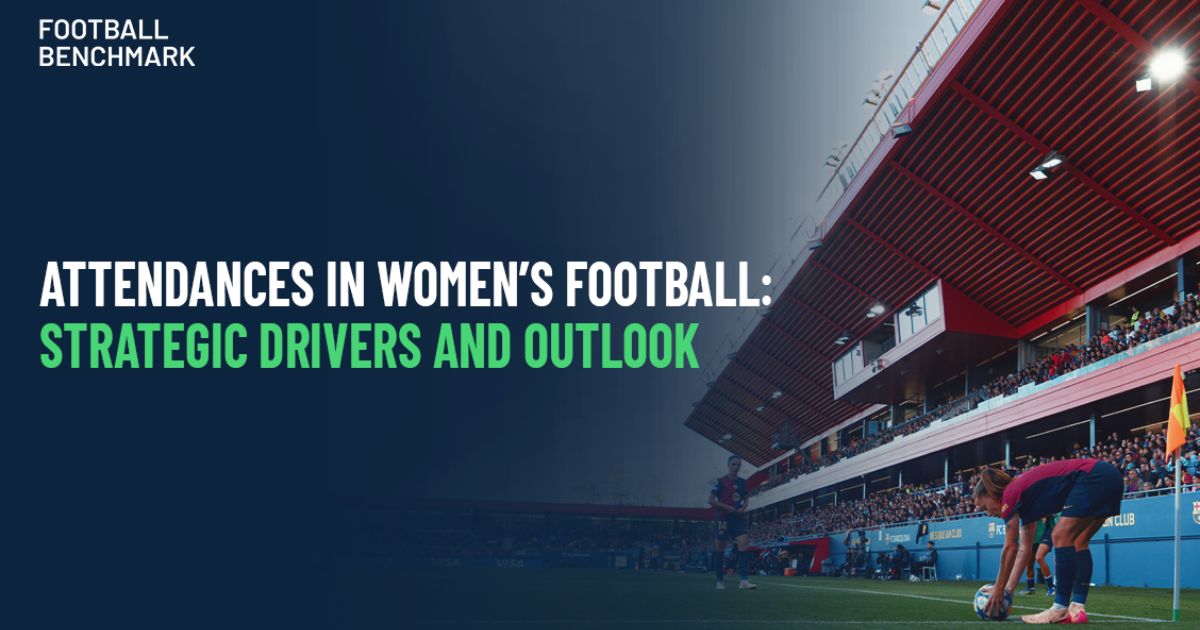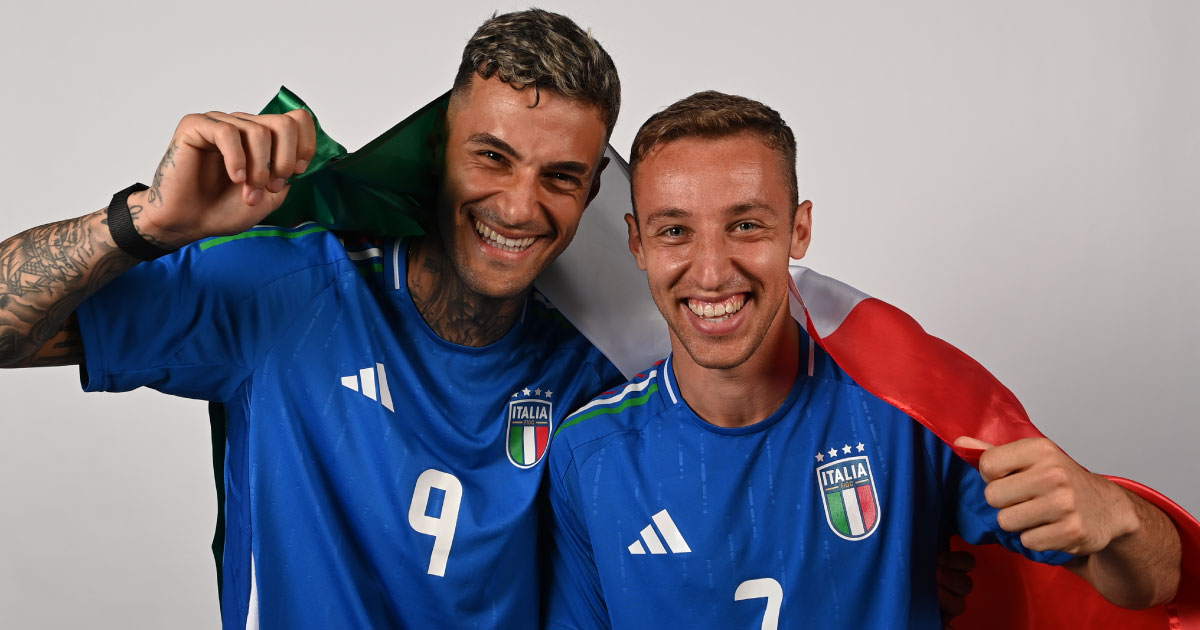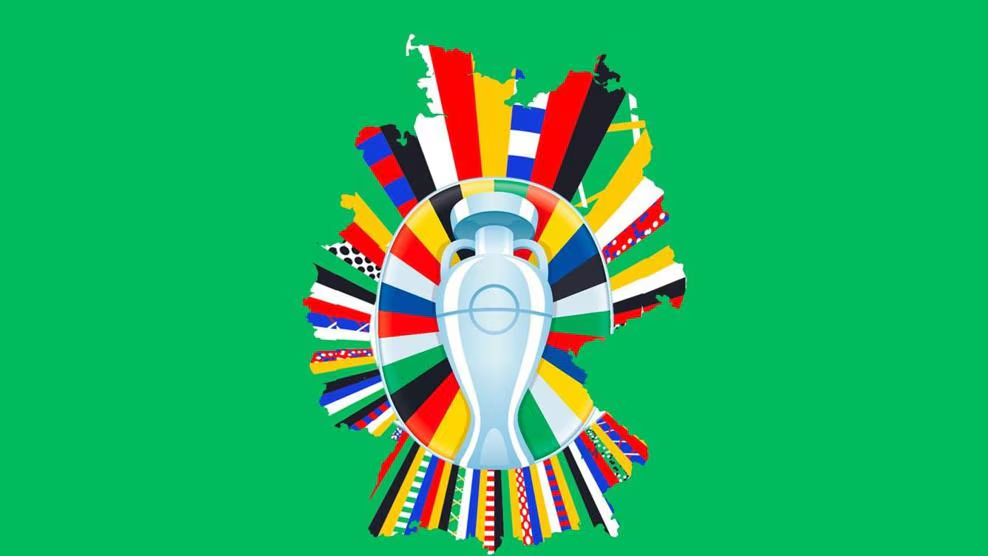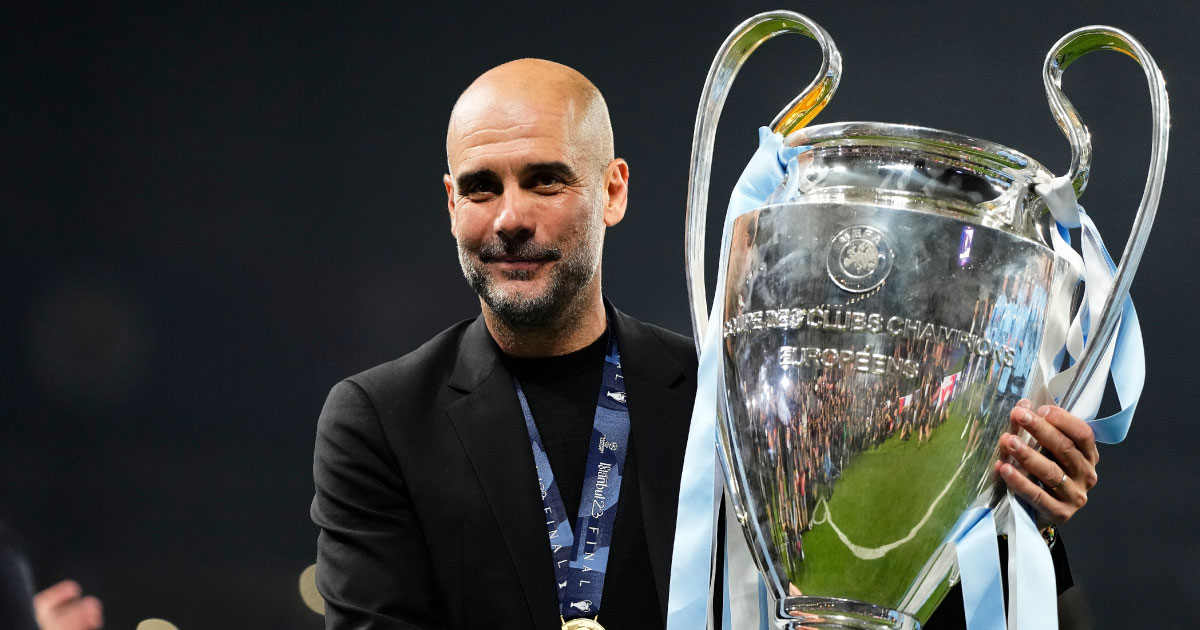Analysis by Football Benchmark
Following last week’s analysis of rising matchday attendances in men’s football, this article shifts focus to the women’s game — where recent seasons have seen promising momentum. European women’s football is gaining traction through increased media coverage, and growing commercial interest, fueling a steady rise in stadium attendances. Yet, infrastructure constraints, intensified competition for fan attention, and misaligned stakeholder priorities have hindered a more cohesive and systematic approach to growing stadium audiences. In a market where significant media revenues are yet to be unlocked, matchday income is set to become a vital pillar of the sport’s commercial model. This article analyses attendance figures and key drivers across UEFA’s top four women’s football leagues – England’s Women’s Super League (WSL), Germany’s Frauen-Bundesliga, Spain’s Liga F, and France’s Premiere Ligue.
Structural trends across leading leagues
First and foremost, it is important to acknowledge that the structural challenges of women’s football significantly impact attendances — particularly through limited stadium accessibility and a lack of mainstream promotion, which restrict fans’ ability to discover and engage with the product. Within this context, the mainstream visibility of national teams during major international tournaments has undoubtedly acted as a key catalyst. In the season following the UEFA Women’s Euro 2022 final, 2022/23, the leagues of both finalists — England and Germany — recorded the largest absolute growth in average attendance, with increases of +3,301 and +1,872, respectively. The WSL’s continued efforts, combined with England’s runner up finish at the FIFA Women’s World Cup 2023, helped push the league’s average attendance above 7,300 in 2023/24. Beyond these visibility boosts, matchday attendances across the four leagues have generally followed an upward trend since the 2021/22 season. As the 2024/25 season nears its conclusion, however, the continuation of this growth appears less certain — even if several high-profile matches are yet to be played. Nevertheless, a successful UEFA Women’s Euro 2025 this summer could once again provide a much-needed boost to domestic league attendances.
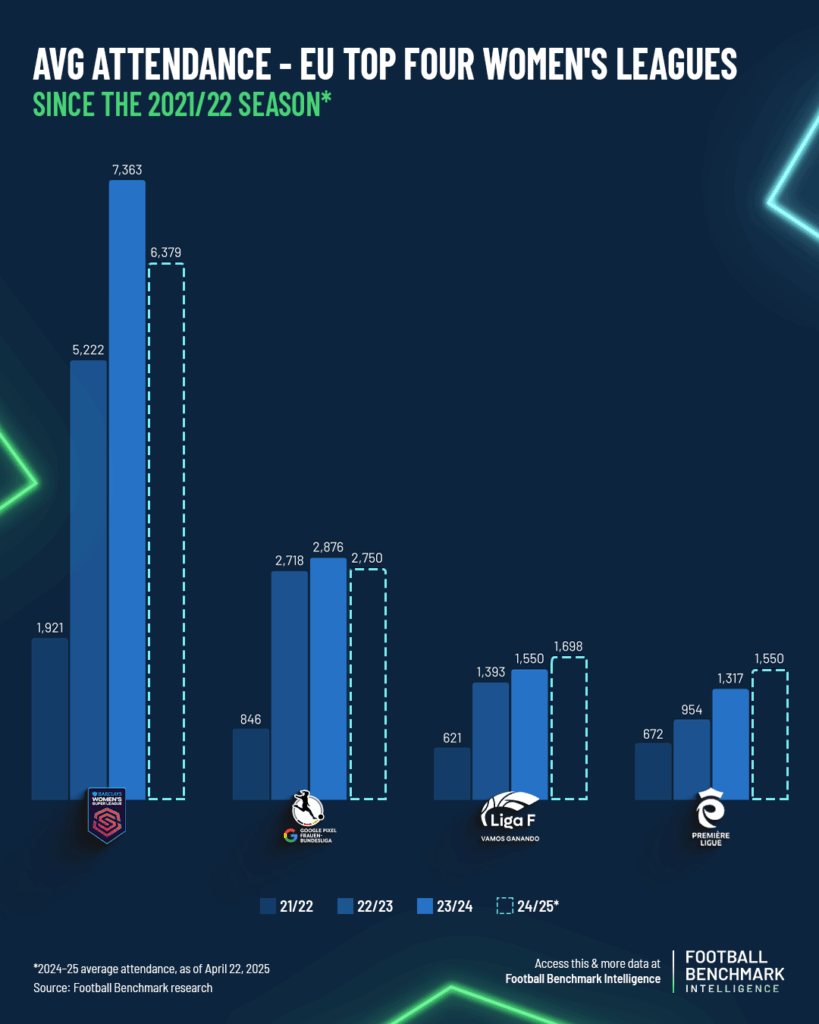
Elite fixtures: growth engines and structural gaps
An initial analysis of league data reveals a consistent pattern: marquee fixtures between top-tier clubs dominate attendance figures. Women’s football matches that combine elements such as elite players, strong rivalries, quality infrastructure, and clubs with established fanbases tend to attract significantly larger crowds. In contrast, lower-tier matchups struggle to draw meaningful attendances. In Spain’s Liga F, attendance at top three clashes is on average 18 times higher than for lower-half fixtures, highlighting the league’s strong reliance on elite clubs. Similarly, in the WSL, encounters between top five sides — particularly those based in London, Manchester, and Liverpool — regularly attract crowds up to eight times greater than matches involving teams outside the top five.
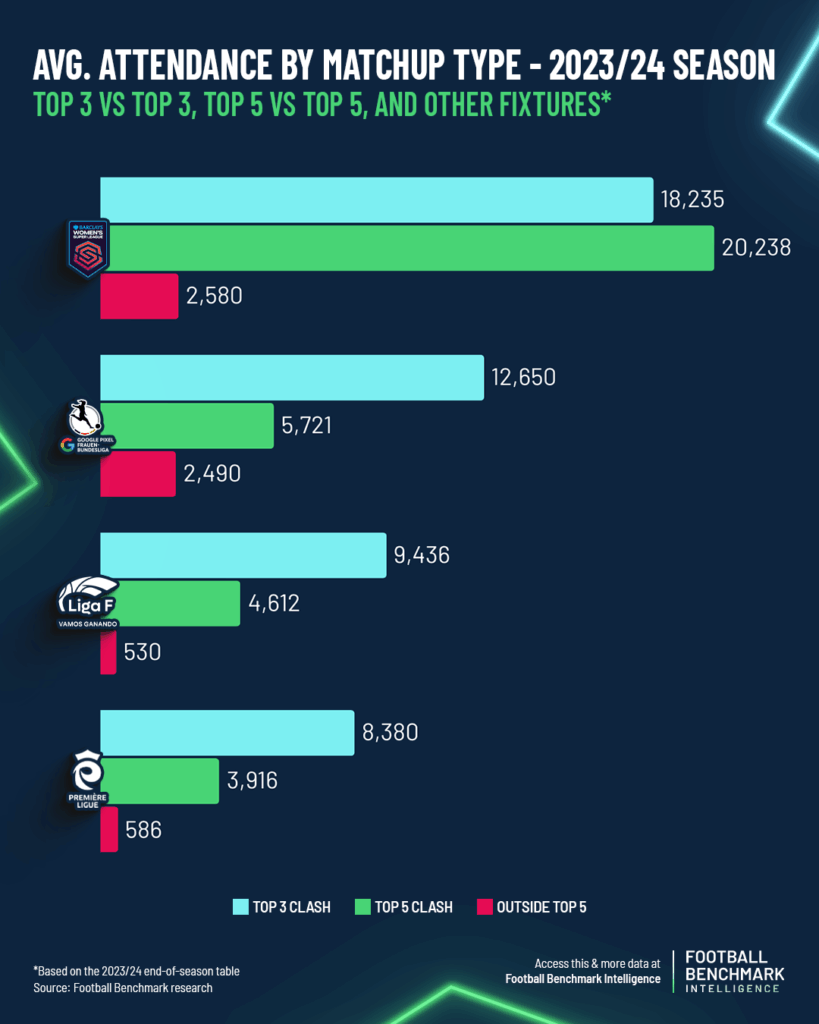
Beyond league position, local rivalries and historic derbies continue to serve as powerful drivers of demand during this early growth phase. Clubs and leagues are increasingly optimizing fixture scheduling and venue selection around these matchups, positioning them as flagship events to elevate the league’s profile. The Manchester derby, for example, has consistently attracted over 40,000 spectators at the Etihad Stadium — more than ten times Manchester City’s average turnout outside of derby matches, typically held at the 7,000-seat Joie Stadium. In Spain, El Clásico between FC Barcelona and Real Madrid has drawn crowds approaching 39,000 at the Lluís Companys Olympic Stadium, compared to FC Barcelona’s league average of fewer than 5,000 at the 6,000-seat Johan Cruyff Stadium. In this context, both the German Frauen-Bundesliga and France’s Premiere Ligue face a unique challenge: the absence of several historic men’s clubs from the women’s top tier. In Germany, major names like Borussia Dortmund, Hamburg, Schalke, and Stuttgart remain outside the top flight; in France, clubs such as Marseille and Lens are similarly absent. Recent examples highlight the untapped potential — a recent cup derby between Hamburg and Werder Bremen drew 57,000 fans to a sold-out Volksparkstadion.
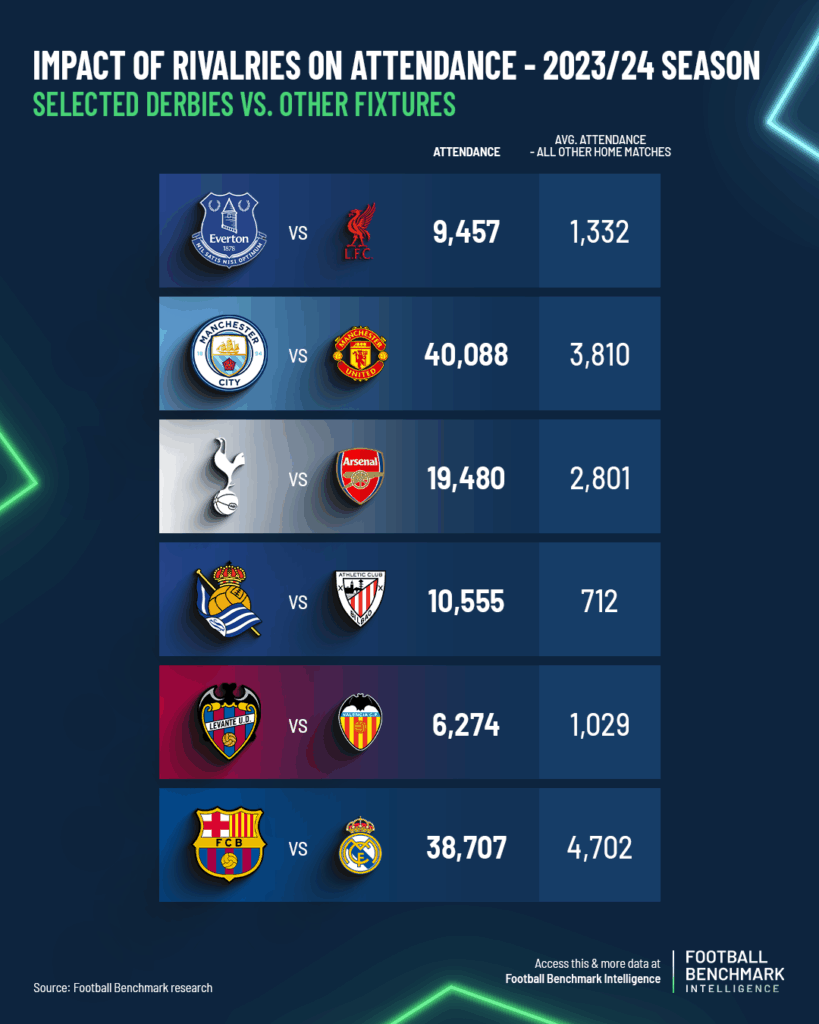
Calendar optimization: strategic match scheduling
Given the impact of marquee fixtures, the complexity of the women’s international calendar, and the ever-busy global football agenda, strategic match scheduling remains one of the most effective — yet underutilized — levers for attendance growth. A low-hanging fruit in this area is the scheduling of high-profile matches during men’s international breaks. Data confirms that this approach delivers results, as women’s matches temporarily occupy prime calendar space with minimal competition for audience attention.
In the 2023/24 season, for example, WSL matches held during these windows reported an 80% increase in average attendance. Similar patterns have been observed in Spain (+90%) and Germany (+96%), while France has seen more muted outcomes, suggesting room for improvement in calendar coordination and promotional efforts. As a result, we expect competition formats and calendars to evolve in the coming years, as rights holders seek the ideal balance between visibility, attendance potential, and long-term growth of the women’s game.
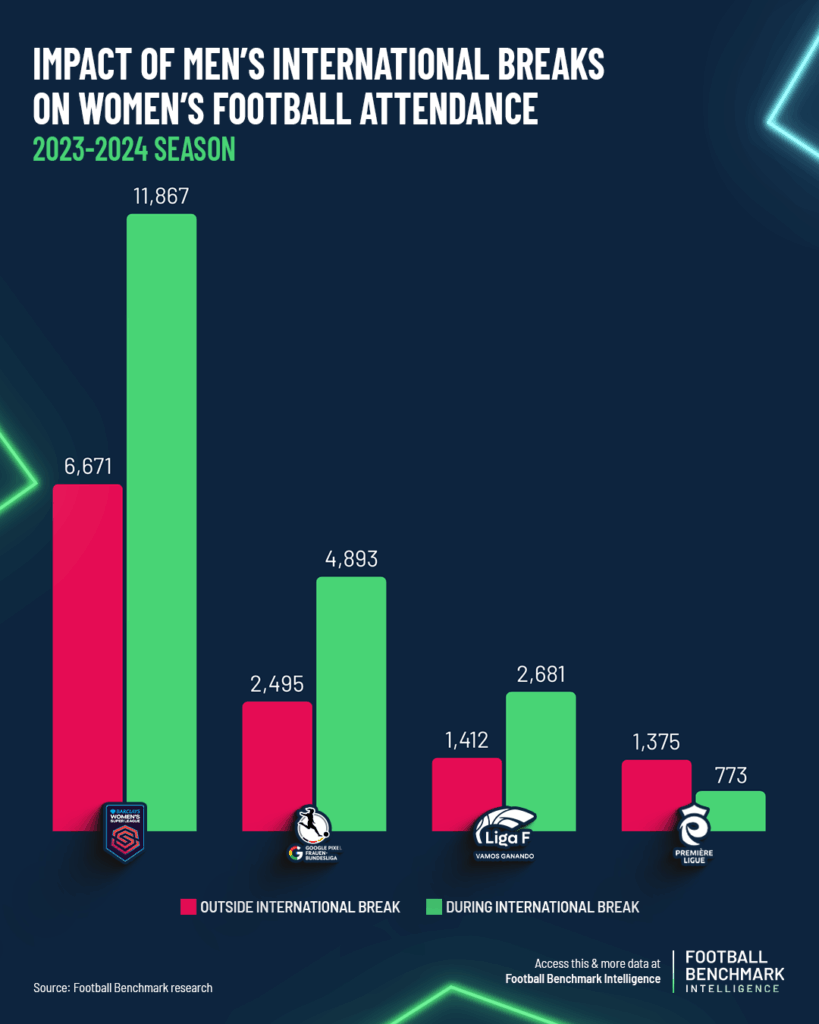
Looking ahead: from momentum to maturity
The 2025/26 season will bring transformative changes to the European women’s club football landscape, with the launch of a revamped UEFA Women’s Champions League and the inaugural UEFA Women’s Europa Cup. These developments are expected to expand access to European competition, providing more clubs with a clear incentive to invest and compete at a higher level. Drawing parallels with the expanded UEFA Champions League in the men’s game, the new formats could increase competitiveness and raise the stakes for a broader group of clubs. The women’s club football ecosystem shall leverage this opportunity to support the evolution from episodic spikes in attention to a model rooted in sustained engagement.
While these changes may intensify competition at the top of the table, maintaining relevance across the full league standings will remain a challenge in the short term without further structural reforms. The task ahead is not only to grow the game, but to do so sustainably — ensuring that women’s football evolves from moment-driven visibility to lasting relevance across the calendar and throughout the league.
Attendances in Women’s Football: Strategic Drivers and Outlook
Analysis by Football Benchmark Following last week’s analysis of rising matchday attendances in men’s football, this article shifts focus to the women’s game — where recent seasons have seen promising momentum. European women’s football is gaining traction through increased media coverage, and growing commercial interest, fueling a steady rise in stadium attendances. Yet, infrastructure constraints, intensified competition for fan attention, and misaligned stakeholder priorities have hindered a more cohesive and systematic approach to growing stadium audiences. In a market where significant
EURO2024, here is the rule that prohibits the main sponsor of the national team team
Within the FIFA regulations, also adopted by UEFA, there is a rule regarding technical equipment and what can be displayed on it. Sponsorships in the world of football began in the early 1970s thanks to the partnership between Jägermeister and Eintracht Braunschweig. This innovation forever changed the world of football, creating connections with various sectors that began to approach the football industry. Since then, a domino effect has involved all major European and global football organizations. However, this phenomenon mainly involved clubs and
International #SportDay: Driving positive change through football
To mark this year’s International Day of Sport for Development and Peace, UEFA is taking part in a United Nations (UN) event highlighting how sport can advance the Sustainable Development Goals and promote peaceful and inclusive societies. Sport’s universality and values make it uniquely positioned to act as a force for good, and the International Day of Sport for Development and Peace (IDSDP), held annually on 6 April, is an opportunity to celebrate that unique position. As the world’s most popular
UEFA launches groundbreaking Carbon Footprint Calculator to drive sustainability in European football
UEFA today announced a significant milestone in its commitment to environmental sustainability with the launch of a carbon footprint calculator tailor-made to football organisations. The UEFA Carbon Footprint Calculator, an innovative online tool, marks a pivotal step towards reducing carbon emissions within the football community and underscores UEFA's dedication to being a proactive force in the fight against climate change. Recognising the pressing need for a reduction of the carbon footprint of European football, UEFA has integrated climate advocacy in its Football Sustainability



